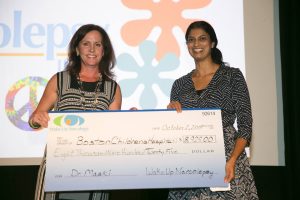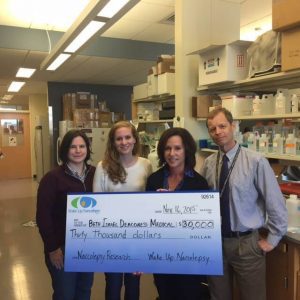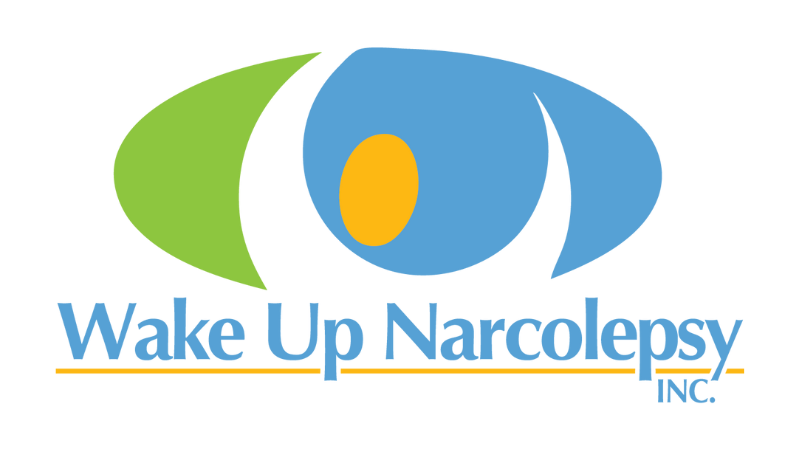Jun 09 2019
Narcolepsy Research Donations
h in Blogs
Fall 2015, Wake Up Narcolepsy (WUN) presents research donations totaling almost $70,000 to accelerate the understanding of narcolepsy and cataplexy.

Wake Up Narcolepsy’s Executive Director and Co-Founder Monica Gow presented a check to Dr. Kiran Masky, Boston Children’s Hospital
Dr. Kiran Maski, Boston Children’s Hospital, received a check in the amount of $8,925 to further analyze the survey data collected from 1800 respondents as part of the Unite Narcolepsy initiative during the 2013 FDA narcolepsy patient meetings. This check was presented to Dr. Maski at the Wake Up Narcolepsy Boston Comedy Event attended by about 150 people and raised $60,000 for the organization.
Additional checks, both in the amount of $30,000 were presented to Dr. Emmanuel Mignot of Stanford Center for Narcolepsy, and Dr. Thomas Scammell, Beth Israel Deaconess Medical/Harvard Medical School, Boston.

Wake Up Narcolepsy Board Member, Laura Fabrizio, with husband Dr. Patrick Fabrizio, and son, Nicholas, present a $30,000 research check to Dr. Emmanuel Mignot and Mali Einen at Stanford Center for Narcolepsy.
Wake Up Narcolepsy grants to Stanford Center for Narcolepsy support advancements in genetics and immunology. This research will lead to identification of who is susceptible to developing narcolepsy. Also we are hopeful it will lead to other therapeutic treatments and preventative measures.

Wake Up Narcolepsy’s executive director, Monica Gow, presents a research check to Dr. Thomas Scammell and researchers at Beth Israel Deaconess Medical Center, Boston
By studying narcoleptic mice, Dr. Scammell’s lab has gained a deeper understanding of what happens what happens in the brain when positive emotions trigger cataplexy, sudden loss of muscle tone.
Narcolepsy is a rare serious medical disorder affecting 1 in 2,000 people. Narcolepsy is still widely misunderstood and misdiagnosed. It is not uncommon for people to go 6-8 years without a proper diagnosis. People who have narcolepsy and cataplexy have had a neurotransmitter called hypocretin destroyed. The most common symptom of narcolepsy is excessive daytime sleepiness in which sleepiness is persistent and that person falls asleep at inappropriate times. Cataplexy is evident in 60% of the people who have narcolepsy. People with narcolepsy and cataplexy experience sudden loss of muscle tone triggered by emotion.
To learn more about narcolepsy or support research, please visit www.WakeUpNarcolepsy.org.
